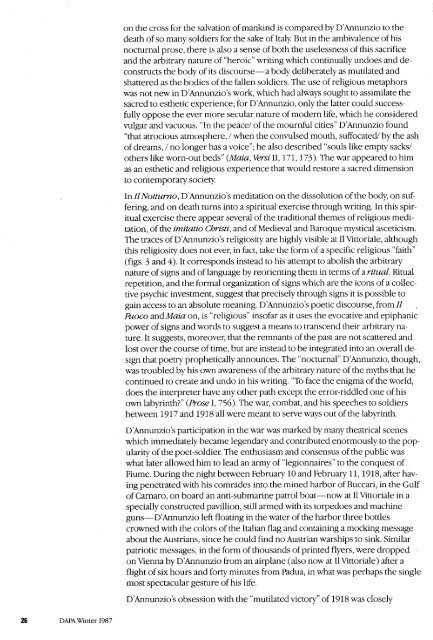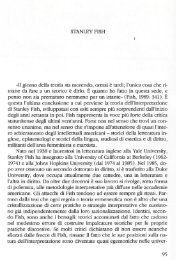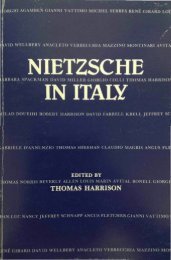The Journal of Decorative and Propaganda Arts - UCLA Department ...
The Journal of Decorative and Propaganda Arts - UCLA Department ...
The Journal of Decorative and Propaganda Arts - UCLA Department ...
You also want an ePaper? Increase the reach of your titles
YUMPU automatically turns print PDFs into web optimized ePapers that Google loves.
DAPA\Tinter 1987<br />
on the cross for the salvation <strong>of</strong> mankind is compared by D'Annunzio to the<br />
death <strong>of</strong> so many soldiers for the sake <strong>of</strong> Italy But in the ambivalence <strong>of</strong> his<br />
nocturnal prose, there is also a sense <strong>of</strong>both the uselessness <strong>of</strong>this sacrifice<br />
<strong>and</strong> the arbrtrary nature <strong>of</strong> "heroic" writing which continually undoes <strong>and</strong> deconstructs<br />
the body <strong>of</strong> its discourse-a body deliberately as mutilated <strong>and</strong><br />
shattered as the bodies <strong>of</strong> the fallen soldiers. <strong>The</strong> use <strong>of</strong> religious metaphors<br />
was not new in D'Annunzio's work, which had always sought to assimilate the<br />
sacred to esthetic experience; for D'Annunzio, only the latter could successfully<br />
oppose the ever more secular nature <strong>of</strong> modern life, which he considered<br />
r.rrlgar <strong>and</strong> vacuous. "In the peace/ <strong>of</strong> the mournful cities" D'Annunzio found<br />
"that<br />
atrocious atmosphere, / when the conlulsed mouth, suffocated/ by the ash<br />
<strong>of</strong> dreams, / no longer has a voice"; he also described "souls like empty sacks/<br />
orhers like worn-out beds" (Maia,VersiIl,ll7,I73), <strong>The</strong> war appeared to him<br />
as an esthetic <strong>and</strong> religious experience that would restore a sacred dimension<br />
to contemporary sociery<br />
InIl Notturno, D'Annunzio's meditation on the dissolution <strong>of</strong> the body, on suffering,<br />
<strong>and</strong> on death turns into a spiritual exercise through writing. In this spiritual<br />
exercise there appear several <strong>of</strong> the traditional themes <strong>of</strong> religious meditation,<br />
<strong>of</strong> the imitatio Cbristi, <strong>and</strong> <strong>of</strong> Medieval <strong>and</strong> Baroque mystical asceticism.<br />
<strong>The</strong> traces <strong>of</strong> D'Annunzio's religiosity are highly visible at Il Vittoriale, although<br />
this religiosiry does not ever, in fact, take the form <strong>of</strong> a specific religious "faith"<br />
(figs. 3 <strong>and</strong> 4).It corresponds instead to his attempt to abolish the arbitrary<br />
nature <strong>of</strong> signs <strong>and</strong> <strong>of</strong> language by reorienting them in terms <strong>of</strong> a rituttl. Ritual<br />
repetition, <strong>and</strong> the formal organization <strong>of</strong> signs which are the icons <strong>of</strong> a collective<br />
psychic investment, suggest that precisely through signs it is possible to<br />
gain access to an absolute meaning. D'Annunzio's poetic discourse, fromll<br />
Rtoco <strong>and</strong>Main on, is "religious" ins<strong>of</strong>ar as it uses the evocative <strong>and</strong> epiphanic<br />
po$/er <strong>of</strong> signs <strong>and</strong> words to suggest a means to transcend their arbitrary nature.<br />
It suggests, moreove! that the remnants <strong>of</strong> the past are not scattered <strong>and</strong><br />
lost over the course <strong>of</strong> time, but are instead to be integrated into an overall design<br />
that poetry prophetically announces. <strong>The</strong> "nocturnal" D'Annunzio, though,<br />
was troubled by his own awareness <strong>of</strong> the arbitrary nature <strong>of</strong> the myhs that he<br />
continued to create <strong>and</strong> undo in his writing. "To face the enigma <strong>of</strong> the world,<br />
does the interpreter have any other path except the error-riddled one <strong>of</strong> his<br />
own labyrinth?" (ProseI,756). <strong>The</strong> war, combat, <strong>and</strong> his speeches to soldiers<br />
between 7917 <strong>and</strong>lglSallwere meant to serve ways out <strong>of</strong> the labyrinth.<br />
D Annunzio's participation in the war was marked by many theatrical scenes<br />
which immediately became legendary <strong>and</strong> contributed enormously to the popularity<br />
<strong>of</strong> the poet-soldier. <strong>The</strong> enthusiasm <strong>and</strong> consensus <strong>of</strong> the public was<br />
what later allowed him to lead an army <strong>of</strong> "legionnaires" to the conquest <strong>of</strong><br />
Fiume. During the night between February 10 <strong>and</strong> February 1 1, 1918, after having<br />
penetrated with his comrades into the mined harbor <strong>of</strong> Buccari, in the Gulf<br />
<strong>of</strong> Carnaro, on board an anti-submarine patrol boat-now at Il Vittoriale in a<br />
specially constructed pavillion, still armed with its torpedoes <strong>and</strong> machine<br />
guns-D'Annunzio left floating in the water <strong>of</strong> the harbor three bottles<br />
crowned with the colors <strong>of</strong> the Italian flag<strong>and</strong> containing a mocking message<br />
about the Austrians, since he could find no Austrian warships to sink. Similar<br />
patriotic messages, in the form <strong>of</strong> thous<strong>and</strong>s <strong>of</strong> printed flyers, were dropped<br />
on Vienna by D'Annunzio from an airplane (also now at Il Vittoriale) after a<br />
flight <strong>of</strong> six hours <strong>and</strong> forry minutes from Fadua, in what was perhaps the single<br />
most spectacular gesture <strong>of</strong> his life.<br />
D'Annunzio's obsession with the "mutilatedvictorv" <strong>of</strong> 1918 was closelv




